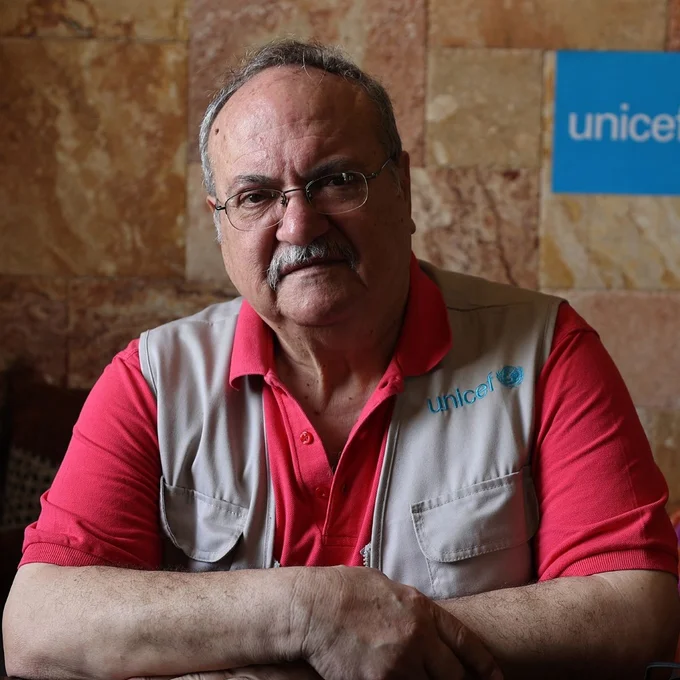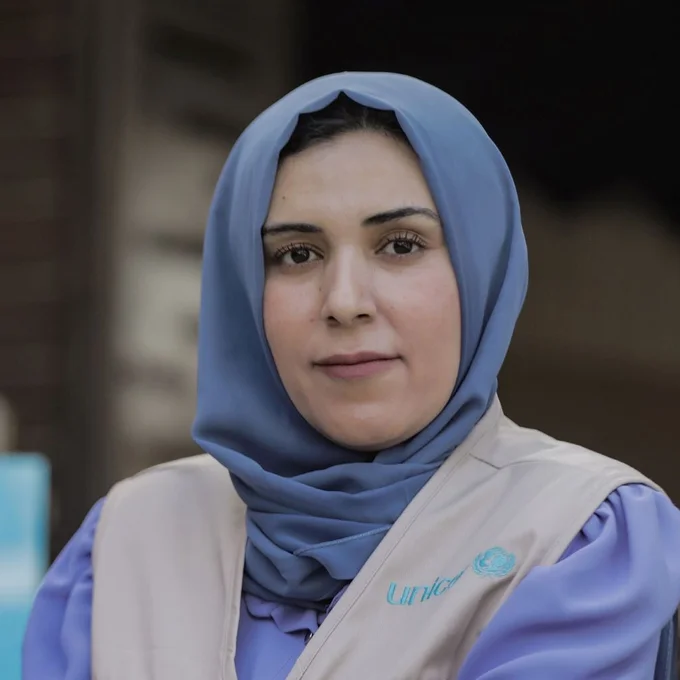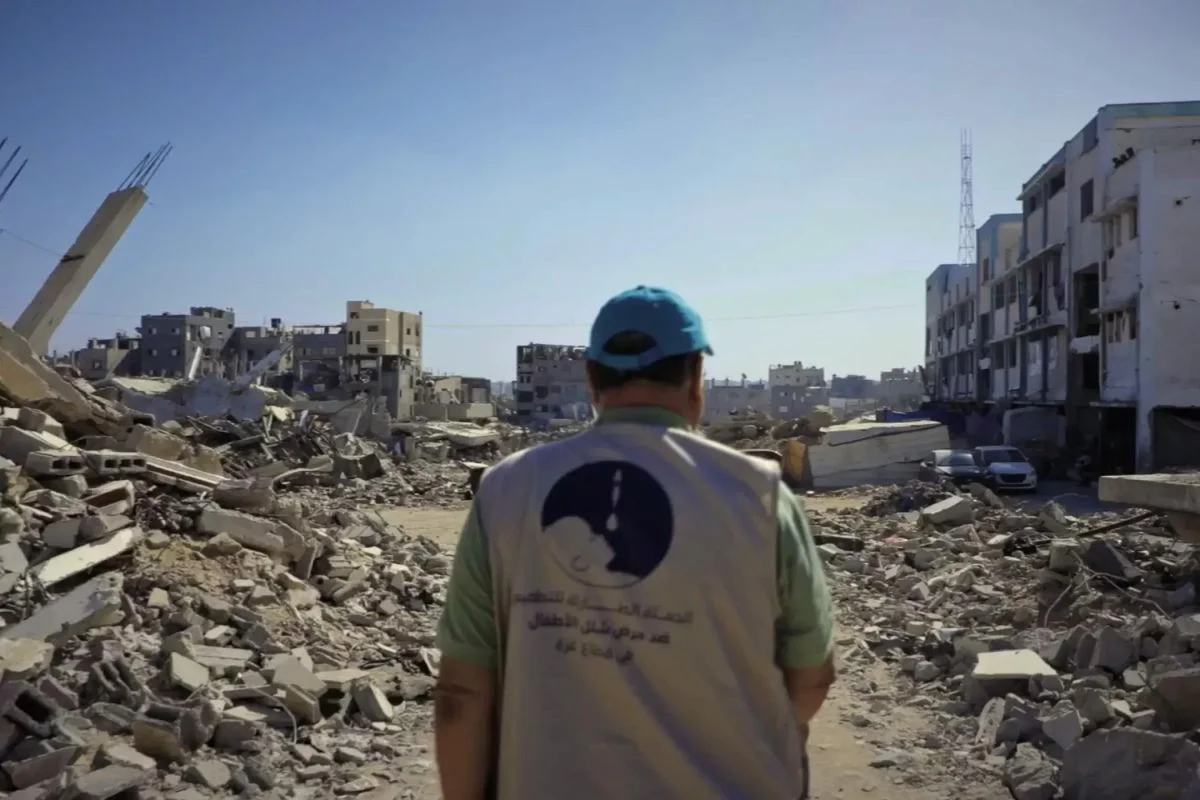The brave humanitarian workers providing life-saving help in war zones. One of them is Dr. Younis Awadallah, who administers polio vaccines to children in Gaza.
When conflicts, disasters and disease threaten children’s lives, every minute counts. Humanitarian aid saves lives all over the world by getting emergency supplies – food, drinking water, hygiene articles, shelter and medical care – to the people who need it.
“Dr. Younis” is a father of four, grandfather and retired physician. He is also one of the protagonists of the documentary film Gaza’s Silent Threat, in which the film team accompanied him during his work. Amid the horrors of war, Dr. Younis organized a campaign to vaccinate children against polio. Individual cases of infections have been detected in children since the beginning of the war in Gaza. Polioviruses have also been found in recent wastewater samples. The only way to stop the disease from spreading is through vaccinations.
Polio can leave children permanently paralyzed or, in worst cases, be fatal. The virus is highly infectious and transmitted through inhalation of airborne droplets. It was once the most common cause of paralysis in children.
Thanks to the polio vaccine, it is on the verge of being wiped out. UNICEF vaccinates over 400 million children around the world against polio annually. Before the war, Gaza had polio fully under control. But when immunization campaigns can no longer be carried out and essential infrastructure is destroyed, outbreaks can occur. Unvaccinated children in affected regions are once again at risk of contracting this potentially deadly disease.
Conducting a polio immunization campaign in a war zone is one of the most complex challenges faced by humanitarian workers in Gaza. Over 80% of the health, water and sanitation infrastructure in Gaza has been destroyed or damaged by military operations. An additional challenge involves maintaining the vaccine’s cold chain until it’s administered. For this reason, generators must be kept running day and night. Gaza does not have unlimited supplies of electricity or fuel. There is constant insecurity regarding the availability of resources, which makes planning more difficult. Internet connectivity is sometimes interrupted by communication outages.
Nevertheless, Dr. Younis and his team are doing all they can to reach every child. They put up posters, make announcements through loudspeakers and send text messages to inform people about the vaccination campaign. They also visit children in their tents.
The work is dangerous, and attacks have forced the team to stop or delay the campaigns.
Dr. Younis is working tirelessly to vaccinate the children in Gaza against polio. Before retirement, he served as a Health Specialist with UNICEF in Gaza. He could be enjoying his retirement years, but the suffering of children would not let him rest. He is the project’s driving force. Dr. Younis is included in Time magazine’s TIME100 Health List of the World’s Most influential People in Health.

“Access to health care is a basic right for all children. Why should our children be denied this right?”
Fairuz Abuwarda is another humanitarian worker facing the dangers of helping children in Gaza. She is the only national UNICEF employee remaining in North Gaza. She has stayed because of her mother, who is too old and fragile to leave. Fairuz leads the immunization campaign field operations in North Gaza, and she knows the dangers from experience. She almost lost her life when an explosion occurred close to her car as she was driving to a vaccination station. Not wanting to leave the children down, she came to work the next day. She radiates an impressive calm and strength.

“The only thing that we can do is continue and help as many as we can. Hope is the only thing that keeps us alive.”
The ongoing war puts not only humanitarian workers like Fairuz and Dr. Younis at risk. It is also keeping children from going to the stations to get vaccinated out of concerns for their immediate safety. 7,000 children in North Gaza could not be reached and remain unprotected from infection.
600,000 children – 90% of the children in Gaza – have been fully vaccinated against polio. However, 95% of Gaza’s children must be vaccinated to achieve herd immunity. 94% of children under the age of 10 received the first round of vaccination, but the vaccine must be administered twice to provide full protection.
As long as the war continues, the children in Gaza are not safe from threats – some visible, some not.
More than ever, Gaza needs people like Fairuz and Dr. Younis to provide children and families with food, water and medical assistance.
Last year, UNICEF
1.5 billion
more than 33 million
251 million
Please support our work by donating to the Emergency Relief Fund. In emergencies, UNICEF is one of the first organizations on the ground delivering vital emergency supplies, ensuring that children are protected, and working to return them to normality as quickly as possible. Thank you for your support.

